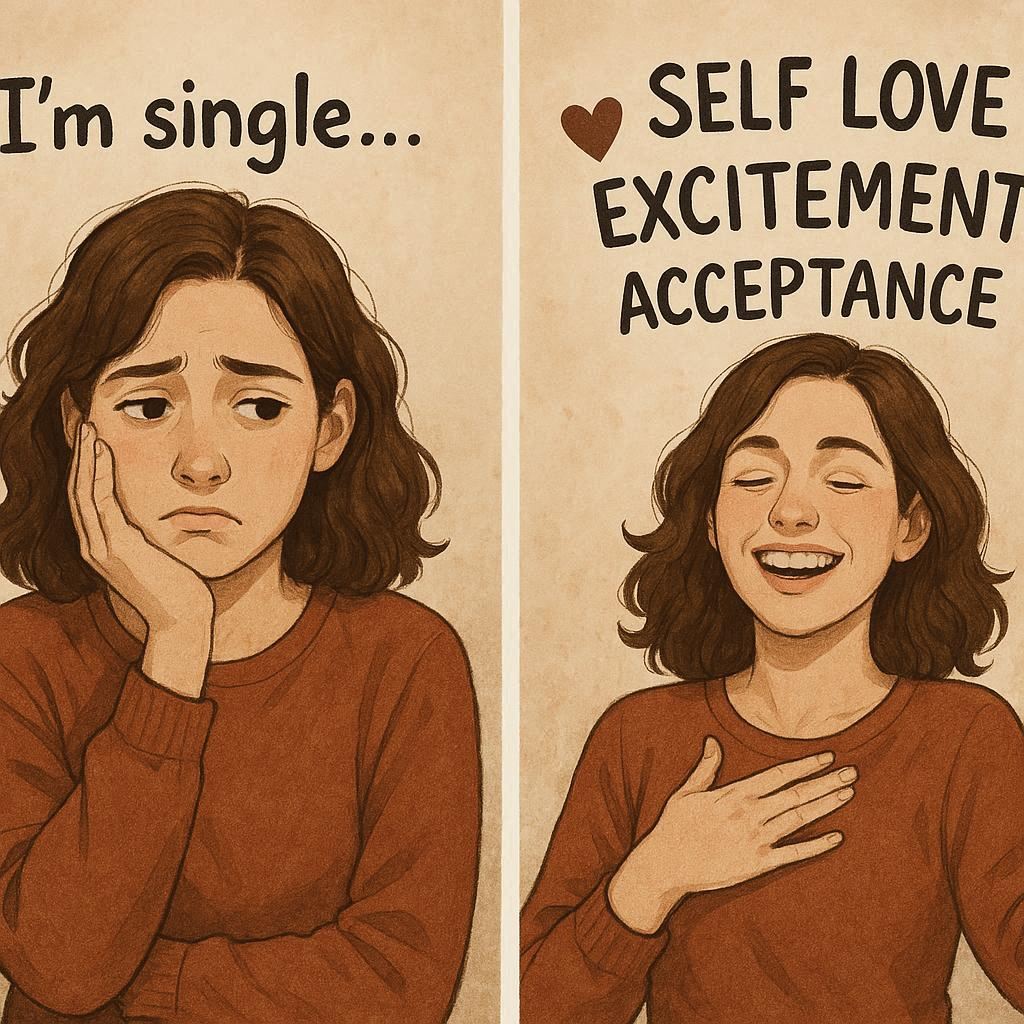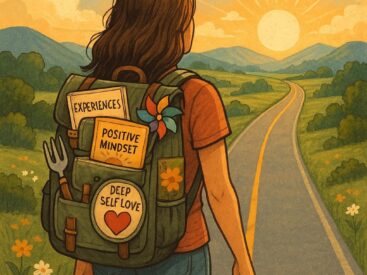There’s a quiet kind of shame that many women carry — the shame of being single.
It hides in the way you respond when someone asks, “So… are you seeing anyone?”
It lingers in the awkward pauses at family gatherings.
It whispers when you scroll through engagement announcements or baby photos, telling you that somehow, you’re “behind.”
But here’s the truth, love — your singleness is not a problem to fix.
It’s not a reflection of your worth, your desirability, or your ability to love.
It’s simply a chapter in your journey — one filled with sacred opportunity for growth, clarity, and becoming.
Being single doesn’t mean you’re weird. It doesn’t mean something is wrong with you.
It means you’ve chosen truth over convenience, alignment over approval, and self-worth over settling.
And that is something to be proud of.
Where shame around singleness comes from — and why it’s outdated
The shame so many feel around being single didn’t appear out of nowhere. It’s the echo of an old world — one that viewed women’s value primarily through the lens of marriage and motherhood.
Historically, being partnered was a matter of survival and social acceptance.
In many cultures, a woman’s stability, status, and even safety depended on being chosen by a man. Single women were often labeled “spinsters,” “unwanted,” or “too independent.” Society didn’t value women who belonged to themselves — it valued women who belonged to someone else.
But that world no longer reflects the truth of who we are.
We now live in a time where women can provide for themselves, define success on their own terms, and choose love not from necessity, but from freedom.
Still, those ancestral beliefs — those generational whispers of “You’re not complete until you’re chosen” — linger in our subconscious. They are internalized messages passed down through families, religions, and culture.
So when that old shame rises, know this: it’s not yours.
It’s the voice of history, not your higher self.
Why other people’s comments aren’t about you
You may notice that the ones who make comments about your singleness — the relatives who tease, the friends who “mean well,” or even the strangers who seem puzzled that you’re not taken — are often speaking from their own fears.
Their discomfort says more about them than about you.
It’s a reflection of how they view safety, acceptance, and identity. For some, being single feels like an unbearable threat — a reminder of loneliness or rejection they never healed. So when they see you standing confidently in your independence, it confronts something unresolved within them.
Let them project. You don’t need to carry it.
When you stay grounded in your self-worth, their words lose power. You can meet their comments with calm certainty — not defensiveness, not guilt — just quiet truth:
“I’m happy where I am. I trust my timing.”
And mean it.
You are whole as you are
One of the biggest lies of our modern culture is that love completes you.
It doesn’t. It expands you.
You are already complete — a full, complex, radiant being with your own rhythm, desires, and purpose.
Love, when it arrives in a healthy form, is not meant to fill a void. It’s meant to dance with your wholeness.
So if you’re single right now, this is not a waiting room before life begins. This is life. This is your time to deepen into yourself — to strengthen your emotional foundation so that when love comes, it meets you at your level.
You’re not avoiding connection. You’re making space for a love that’s worthy of your truth.
You’re not settling for “anyone” — you’re choosing alignment
There’s a huge difference between being single because you can’t find someone, and being single because you won’t settle for just anyone.
You know you could be in a relationship tomorrow if you lowered your standards, ignored red flags, or silenced your intuition.
But that’s not who you are anymore.
You’re someone who wants connection built on truth, mutual respect, shared values, and emotional safety. That kind of love requires discernment. It requires saying no to what doesn’t serve your highest self.
And that’s not loneliness — that’s integrity.
Choosing alignment is not a lack of options; it’s a declaration of self-worth.
From shame to self-love: understanding what shame is really saying
Shame often disguises itself as self-criticism — those thoughts like:
- “Maybe I’m too much.”
- “Maybe I’m not lovable enough.”
- “Maybe I’m the problem.”
But shame is rarely about you. It’s an emotional echo that says, “I feel unsafe being fully myself.”
It’s your nervous system trying to protect you from rejection or exclusion. In the past, belonging meant survival. But today, your belonging begins with yourself.
When you approach your shame with curiosity instead of judgment, it begins to lose its grip.
You realize that your shame is not a truth — it’s a story that’s ready to be rewritten.
Reflective questions: shining light on your shame
- When did I first start believing that being single was something to be ashamed of?
- Whose voice do I hear when I feel “behind” or “less than” for not being in a relationship?
- What would it mean to fully accept where I am right now — emotionally, spiritually, and energetically?
- In what ways am I already living the love and wholeness I seek?
- How would I speak to a dear friend who felt this same shame? Can I extend that same compassion to myself?
Transforming shame into self-love, acceptance & pride
Healing shame isn’t about forcing yourself to feel confident overnight. It’s about slowly replacing old narratives with truth.
Below are three practical exercises to support your transformation from shame to self-love:
1. The ancestral rewrite journal practice
Take out your journal and finish the sentence:
“In my family, women were taught that being single means __________.”
Write freely — without judgment. Then, underneath it, write:
“But the truth for me now is __________.”
This helps you consciously separate what you inherited from what you actually believe.
By rewriting the story, you reclaim authorship of your identity.
2. The mirror affirmation ritual
Each morning, look into your eyes in the mirror and say:
“I am whole on my own. Love is already within me. I don’t need to be chosen to be enough.”
At first, it might feel awkward — even emotional. That’s okay. You’re reprogramming years of conditioning.
Over time, your energy will begin to shift — not through forced positivity, but through embodied truth.
3. The embodiment of pride practice
Choose one small way each week to celebrate your independence — not as rebellion, but as reverence.
It could be:
- Taking yourself out for coffee and bringing your journal.
- Buying yourself flowers.
- Booking a solo trip.
- Spending an evening doing something that genuinely brings you joy.
Each time you celebrate yourself, you anchor the message:
“My life is full. My presence is enough.”
You are teaching your nervous system that singlehood is not lack — it’s liberation.
The societal shift — from dependence to conscious choice
Let’s be honest: the world is still catching up.
There are still people, systems, and media that glorify coupling as the ultimate marker of success. Romantic love is beautiful — but it’s not the only form of love that matters.
In the old world, women needed marriage for security. In the new world, we seek partnership for alignment.
In the old world, women were chosen. In the new world, we choose.
Your singleness is not rebellion — it’s evolution.
It’s part of a collective rebalancing where women are learning to love from fullness, not fear.
And you, standing grounded in your truth, are a living embodiment of that shift.
Reflective questions for deeper integration
- What does being “whole” mean to me — beyond relationships or titles?
- How has my singleness helped me grow emotionally or spiritually?
- What kind of love do I now know I will never again settle for?
- How can I show gratitude for this season of my life — even if it’s not what I envisioned?
- What part of me is quietly thriving now that I’m not compromising myself for love?
When you feel the ache — remember this
There will be moments when it stings. When you long for partnership, touch, companionship. That’s human. You’re not weak for wanting love.
But notice the difference between desire and desperation.
Desire says, “I’m open to love when it’s right.”
Desperation says, “I’ll take love even if it costs me myself.”
You’re done with the latter.
You’ve done the inner work. You’ve faced the loneliness. You’ve built something beautiful within yourself.
And from that foundation, love will meet you — the kind that feels like peace, not proof.
You are the love you’ve been waiting for
Every time you choose self-respect over people-pleasing, every time you choose truth over attachment, you are embodying love.
You’re not waiting for someone to make you whole — you’re creating wholeness in real time.
The more you live from that energy, the more life mirrors it back.
Because love — true, conscious, aligned love — can only meet you where you’ve already met yourself.
So walk with your head high, heart open, and soul grounded.
You are not broken. You are not behind.
You are the woman who chose to become whole before she chose a partner — and that’s the most beautiful love story of all.
Closing reflection
Place your hand on your heart and whisper:
“I release the shame of being single. I honor the woman I am today. I am whole, I am worthy, and I am free.”
Let it settle into your body. Feel the peace that follows truth.
You are not missing out — you are rising into yourself.



